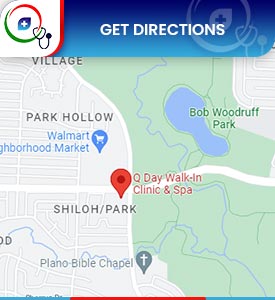Confidential STD Testing Clinic in Plano, TX
Dr. Mohammed Aqueel Ahmed offers confidential STD testing in Plano, TX, ensuring your privacy and peace of mind. Our discreet services are designed to provide accurate results with compassion and care. Trust Dr. Ahmed for a safe, comfortable experience in managing your sexual health. For more information, contact us today or book an appointment online. We are conveniently located at 3560 E Park Blvd Plano, TX 75074.


Table of Contents:
What STD/STIs can I get tested for?
What happens during STD/STI screening?
What symptoms can occur with an STD/STI?
How are STDs/STIs treated?
How can I prevent STDs/STIs?
There is a wide range of STDs/STIs you can be tested for. Which test is right for you will depend on various factors such as sexual activity, symptoms, and gender at birth.
In order to prevent HIV infection in adults and adolescents from 13 to 64, they should be tested at least once. Every year, sexually active women younger than 25 should be tested for gonorrhea and chlamydia. Each year, women over 25 years of age with risk factors, such as multiple or new partners or a partner with an STD, should be tested for gonorrhea and chlamydia. Pregnant women should be tested for syphilis, HIV, hepatitis B, and hepatitis C as early as possible. Starting early in pregnancy, those at risk for infection should also be tested for gonorrhea and chlamydia. Some cases may require repeat testing.
To check for STIs, your doctor may order a variety of tests depending on your sexual history. Urine or blood samples can be used to test for most STIs. It’s possible that urine and blood tests are less accurate than other types of tests in some cases. Blood tests may not be reliable for up to a month after exposure to some STIs.
A person who contracts HIV, for example, may not be tested for the infection for a few weeks to a few months after contracting it. In order to check for STIs, many doctors use vaginal, cervical, or urethral swabs.
Persistent HPV infections, especially those caused by HPV 16 and HPV 18, are associated with an increased risk of cervical cancer. HPV infections can also cause anal cancer in people who have anal sex. There is no way to tell whether you have an STI based on a normal Pap smear result. A separate HPV test will be ordered by your doctor to check for HPV.
STIs, such as herpes and genital warts, can be diagnosed by a combination of physical examination and other tests. Sores, bumps, and other signs of STIs can be detected by a physical exam by a doctor. They can also send samples to a laboratory for testing from any questionable areas.
There are many sexually transmitted infections (STIs), also called sexually transmitted diseases (STDs).
In 2018, 68 million Americans lived with STIs, according to the Centers for Disease Control and Prevention (CDC). The number could be higher since many STIs go unreported.
It can be difficult to detect many STIs because they don’t have any symptoms or have very vague symptoms. Some people are also discouraged from getting tested for STIs because of the stigma associated with them.
STIs can cause serious health problems, such as cancer and infertility if left untreated. The only way to know if you in fact have an STI is to get tested.
Sexually transmitted infections (STIs), regardless of their cause, can be treated, even if a cure is not possible. Antibiotics are used to treat some, but not all, STIs.
Chlamydia, gonorrhea, and syphilis are bacteria-caused STIs, which can be treated and cured with antibiotics. The symptoms of STIs caused by viruses, including genital warts and genital herpes, can be relieved with treatments. AIDS is caused by the human immunodeficiency virus (HIV), which is treated with many medicines but is not cured.
Whenever possible, avoid sex with anyone who has genital sores, a rash, discharge, or other symptoms of a sexually transmitted disease. If you and your partner have sex only with each other, and you both tested negative for STDs at least six months ago, unprotected sex is safe.
Every time you have sex, use latex condoms. Make sure the lubricant you use is water-based. During the entire sex act, use condoms. There is no 100% guarantee that condoms will prevent disease or pregnancy. When used properly, they are extremely effective. Make sure you use condoms correctly. Get available vaccines such as hepatitis B. And wash before and after intercourse. STD/STI testing is available at Q Day Walk-In Clinic. For more information, call us today or book an appointment online. We are conveniently located at 3560 E Park Blvd Plano, TX 75074. We serve patients from Plano TX, Frisco TX, Garland TX, Carrollton TX, McKinney TX, Murphy TX, Wylie TX, and surrounding areas!
Check Out Our 5 Star Reviews





